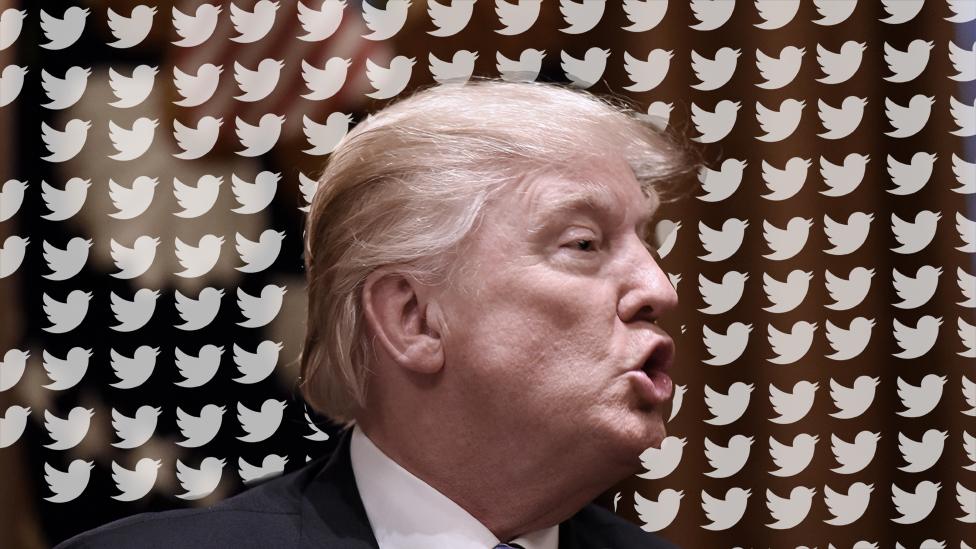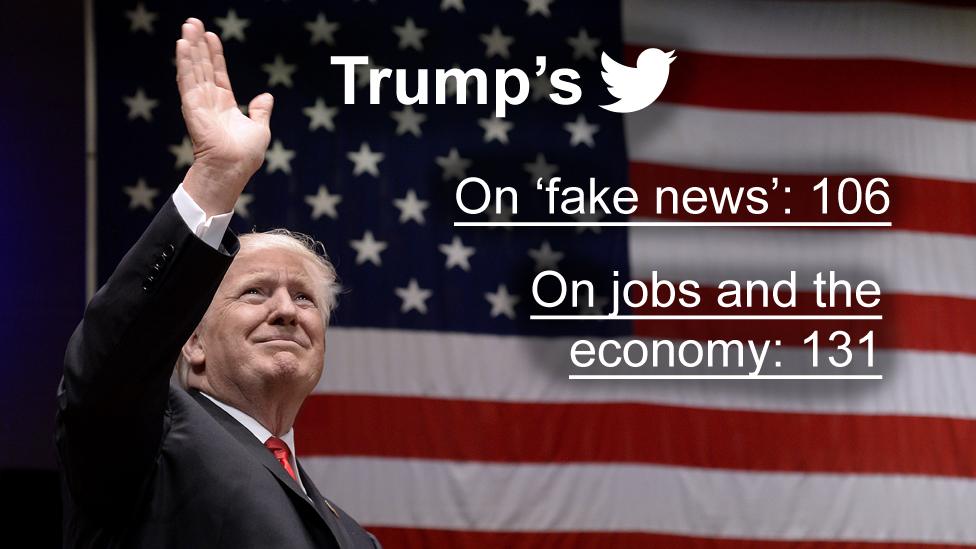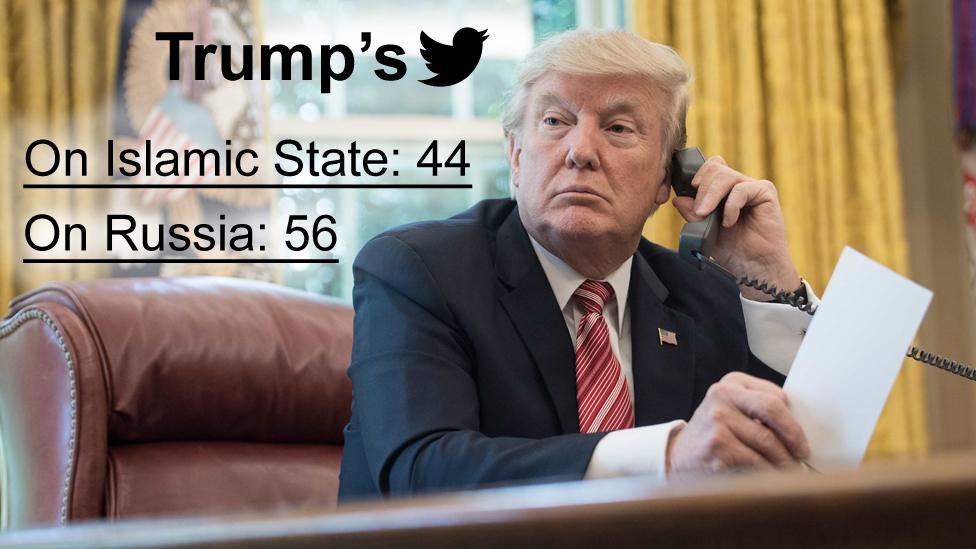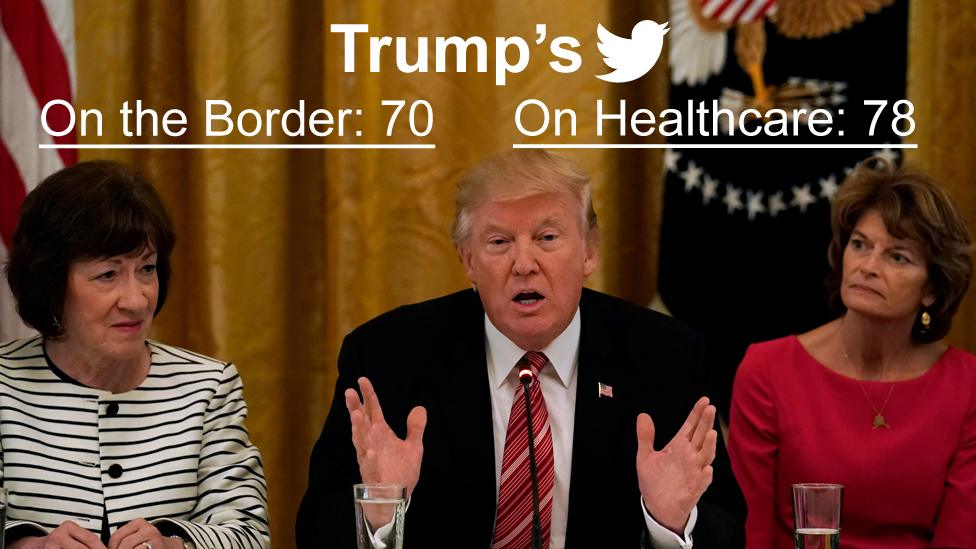Judge me on four things, said Trump. So we did
- Published

President Trump claims the news media isn't paying attention to real policy issues, like jobs, the economy, so-called Islamic State and the border.
"At some point the Fake News will be forced to discuss our great jobs numbers, strong economy, success with ISIS, the border & so much else!" he tweeted.
Six months into his presidency, how is he faring in these areas? And how much is he tweeting about these policy priorities?

1. Jobs
During the campaign, Mr Trump vowed to create 25 million jobs over 10 years and become "the greatest jobs president... ever".
In the past he discredited US jobless figures, claiming the actual unemployment rate was over forty per cent. Now he's America's CEO, he's embracing the same figures he once described as "phony".
So, are the jobs numbers "great", as his tweet suggests?
Yes - the jobs market is looking healthy, with the overall trend showing that unemployment is falling.
The president is also right when he says there are more jobs around - in June 222,000 jobs were created.
But this steady economic performance isn't a drastic change from what we saw under President Barack Obama, when job growth increased at a steady pace.
One area where that growth isn't being matched is in wages, and there have been calls for President Trump to address this issue.
Where did Trump the Outsourcing Slayer go?
Then there's his promise to bring more jobs back to the US from overseas - a pledge which energised much of his base.
Shortly after his election victory he spoke of how he had saved 1,100 jobs with the Indiana based air conditioner firm, Carrier. Months later, 600 of those jobs are still moving to Mexico.
Other companies like Ford are expanding production overseas, rather than in the US.
Despite the president's assurances he would reverse what he described as "job theft" overseas, it's proving difficult.


2. Economy
The latest growth figures, released since President Trump took office, showed a decline in the GDP rate (1.4%) in the first three months of this year, compared with the three months preceding (2.1%).
It was one of the worst readings for nearly a year, but not necessarily bad news for President Trump, as economists say the first quarter of the year usually posts a lower rate.
Fact-checking Trump's US economy boasts
Overall, the president is correct when he characterises the US economy as "strong". Upward growth is part of a trend, in which the US economy has picked up since the financial crisis in 2008.
The White House has set a growth target of 3%, but this does look like a challenge, as growth has only averaged less than 2% a year since 2001. The Congressional Budget Office currently estimates growth at about 1.9%.
Trump : 'I just don't want a poor person' running the US economy
President Trump often boasts about how the stock market has risen since he took office. He can take credit for this in part.
Some of the improvement in the markets can be attributed to anticipation that the president and the Republican pledge to reduce taxes and cut regulations will be implemented.
But he's still not managed to pass tax reform laws.

3. Fighting Islamic State

During the campaign Donald Trump didn't mince his words when it came to so-called Islamic State (IS), famously using an expletive to describe how much bombing he would carry out.
He added: "I'd just bomb those suckers. I'd blow up the pipes, I'd blow up the refineries, I'd blow up every single inch - there would be nothing left."
Back then Mr Trump was wary to reveal details but promised he had a "secret plan". Since entering office, he has ordered a review of US policy on IS.
Despite criticising his predecessor's handling of the militant group ("he's the founder of ISIS"), the Trump administration's strategy is strikingly similar. It includes continuing strikes and targeted raids, more support to local forces, and freezing the assets of IS operatives.
The goals are the same too - to take control of IS strongholds like Raqqa in Syria and Mosul in Iraq - and coalition forces have already seen success in the latter.
But there are some key differences in tactics. One is the decision to arm Syrian Kurds to help take Raqqa, despite objections from the Turkish government.
The second is a tougher stance on "annihilating" IS fighters, which has led to a rise in the number of civilian casualties caught up in attacks.
The third is that the Trump administration is authorising a far greater number of air strikes as it makes its push, and has ramped up operations against IS in Afghanistan, Yemen and Somalia.
In Afghanistan his administration dropped the "Mother of All Bombs" to kill IS militants. And, when President Trump authorised a strike against a chemical weapons factory in Syria earlier this year, he showed he's not afraid to use military force when he feels it is necessary.
It shows another key difference between him and his predecessor Barack Obama, who promised such action, but didn't deliver.

4. The border

Securing America's borders was the centrepiece of Donald Trump's election pitch. At campaign rallies he promised to crack down on illegal immigrants in the US, with his focus on criminals.
He often raised the case of Kate Steinle, a young woman from Seattle who was killed by an illegal immigrant who had been deported five times.
Six things that could topple Trump's wall
At the end of June he introduced "Kate's law" which would increase penalties for immigrants who re-enter the US after they've been deported. It was passed by the House of Representatives, and will now come before the Senate.
In the president's first 100 days, more than 41,000 people were arrested on the suspicion they were in the US illegally, an increase on the previous year. About 10,800 had no criminal conviction, compared with 4,200 the previous year.
US immigration raids leave many 'afraid to open the door'
But despite his tough talk on the issue, President Trump actually deported fewer people in his first 100 days than Barack Obama.
In Trump's first 100 days 54,564 people were deported, compared with 62,062 for the same time period in the previous year under his predecessor.
And let's not forget Donald Trump's plans to tighten the border even further - his flagship plan to "build a wall" is moving along. Companies have until September to pitch their prototypes. At a recent rally in Iowa, the president said it could be a "solar wall" which would pay for itself.
How will President Trump deliver on border wall promise?
For months the president's travel ban was blocked by the courts and failed to become law.
After a decision by the US Supreme Court in June, it's partially in effect, but it's not as drastic. Visitors from the six designated countries can still enter, if they have a bona fide connection to the US.
Follow Rajini Vaidyanathan on Twitter - @BBCRajiniv, external